‘It’s about our people.’ Exclusive tour of North Carolina’s first marijuana dispensary
On a cloudy, cool morning in late March, workers tended to 30,000 marijuana plants growing, hanging and drying behind security-monitored gates in the North Carolina mountains.
Some methodically trimmed buds in a room to yield flower with the best aroma, look and price. Others on the grounds packed a variety of marijuana into protective bags for storage in a minus-27-degree freezer that released a blast of arctic air when opened.
“Stand away,” a worker cautioned.
A grader hummed in the near-distance smoothing land for a planned extraction and processing building, where cannabis will be transformed into many products before sale.
Another humming seized — as a generator running the walk-in freezer ran out of diesel fuel. The generator provides power until Duke Energy hooks the property into its system.
Workers, within minutes, refueled and put the groundbreaking operation back on track.
Just months from opening what officials with the Eastern Band of Cherokee Indians say will be the world’s largest medical cannabis dispensary superstore, the Cherokee are ramping up production and genetics research on the Qualla Boundary. It’s the first instance of marijuana being tested and sold legally in North Carolina.
Applications, which require a health care professional’s signature, are available now online. Medical marijuana cards will be required to buy products at the dispensary.
Beginning Thursday (4/20), the Cherokee Cannabis Control Board, which regulates the operation, will begin processing applications — first for medically eligible tribe members, followed by the public — board Executive Director Neil Denman said.
The Charlotte Observer in late March was granted an exclusive behind-the-scenes tour of the tribe’s dispensary under construction and its established grow operation, part of the Cherokee’s 57,000-acre territory — a sovereign nation outside the bounds of North Carolina’s prohibition on marijuana.
The Tribal Council first voted about two years ago to legalized controlled use of marijuana on Cherokee land and to grow and sell it.
“We’re building this for the Cherokee people,” general manager Forrest Parker said.
“We’re building this for the community. We’re building this for anybody that can be benefited, that wants help, that wants medicine that needs it for whatever reason they have.
“We want it to be profitable, but it’s about our people.”
North Carolina marijuana dispensary opening
Qualla Enterprises LLC is the tribe’s for-profit cannabis venture, and it intends to open the EBCI’s mega dispensary “in a limited capacity” in late summer or fall, Parker said. The Cherokee have no date set for opening the dispensary’s doors, but are “beyond 60% to 70%” there, he said.
“I just left a room full of tribal leaders, and I had to give them the same answer,” Parker said in late March. “Cannabis is agriculture. It takes time to grow an agricultural product.
“So the opening of a retail store in a vertical operation such as this is 100% contingent on our ability to build the infrastructure, to grow, process, manufacture, test, package, label and retail cannabis,” he said.
Cherokee members are refashioning their massive old bingo hall on U.S. 19 South near Harrah’s Cherokee Casino Resort into the dispensary that is a first of its kind in North Carolina — poised to be the only location in a three-hour’s drive from Charlotte where weed is sold legally. The site is about 4-1/2 hours from Raleigh.
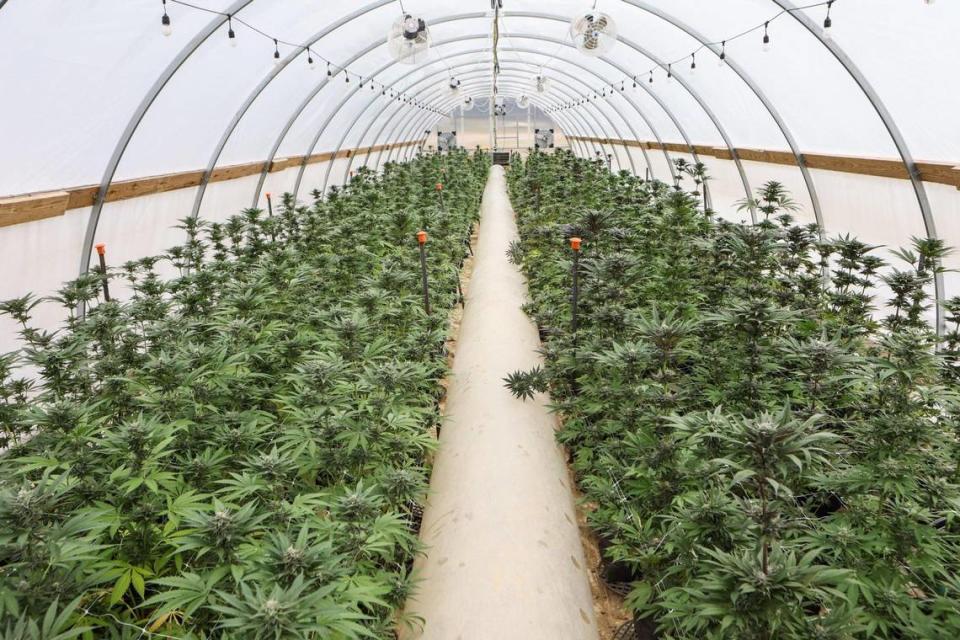
Its marijuana plants in late March were soaked in light inside 25 temperature- and humidity-controlled hoop houses on Goose Creek Road, 7 miles from the dispensary. Under the watchful, trained eyes of workers, some of the plants just recently sprouted. Others stood 3- or 4-feet tall.
The plants had a light scent, more like an herb than the earthy, musky cloud from a toker’s joint.
Only in a room where huge batches of more mature plants hung to dry did the classic Mary Jane smell reveal herself.
The Cherokee intend to produce 1,200 pounds a week of cannabis and sell it in 250 products at the dispensary, which will have a drive-thru shopping option, Parker said. Workers began harvesting marijuana in November and will sell it in the dispensary as flower, prerolls, vapes, concentrates, edibles and topicals.
Phones “are ringing off the hook” with hundreds of callers a day from North Carolina and other states wondering how to get a card and when the store will open, Parker said.
In the months ahead, the tribe will expand its marijuana growing to 77 hoop houses.
In time, the workforce supporting medical marijuana cultivation and sales could grow to more than 400 people, leaders say. For now, it’s around 50-people strong: All part of the inaugural grow making history in North Carolina.
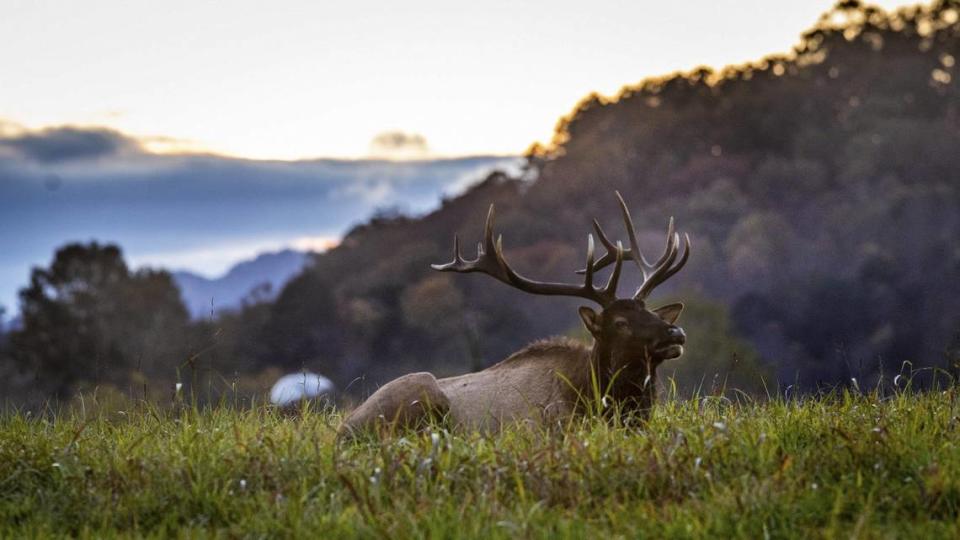
Peaceful, easy setting
Deer, elk, rabbits and pheasants frequent land near the grow operation, which is a 5-minute drive from Kituwah, the original Cherokee “mother town.” In 1761, during the French and Indian War, the forces of reviled British Col. James Grant destroyed the town.
Qualla Boundary lies 46 miles west of Asheville, past Lake Junaluska and Maggie Valley and down a hairpin curvy, stomach-churning, cliff-hanger stretch of N.C. 19. It ain’t for the faint.
About 9,600 people live on Qualla Boundary, 77% Indian, 23% non-Indian, according to the census. EBCI has 14,000 total members.
Most all of the 51 workers on site are Eastern Band members. The Cherokee expect 80% of the eventual workforce to be from the EBCI, Parker said.
The first thing evident was the tight security at the grow operation. Fence surrounds the property. A locked gate bars entry to outsiders. A security guard requested driver’s licenses to confirm identities.
The second thing that struck us was the absence of the strong marijuana smell in the grow houses. Qualla is planting over 50,000 lavender seedlings, which, through natural and sustainable ways, mitigate odors and attract beneficial insects.
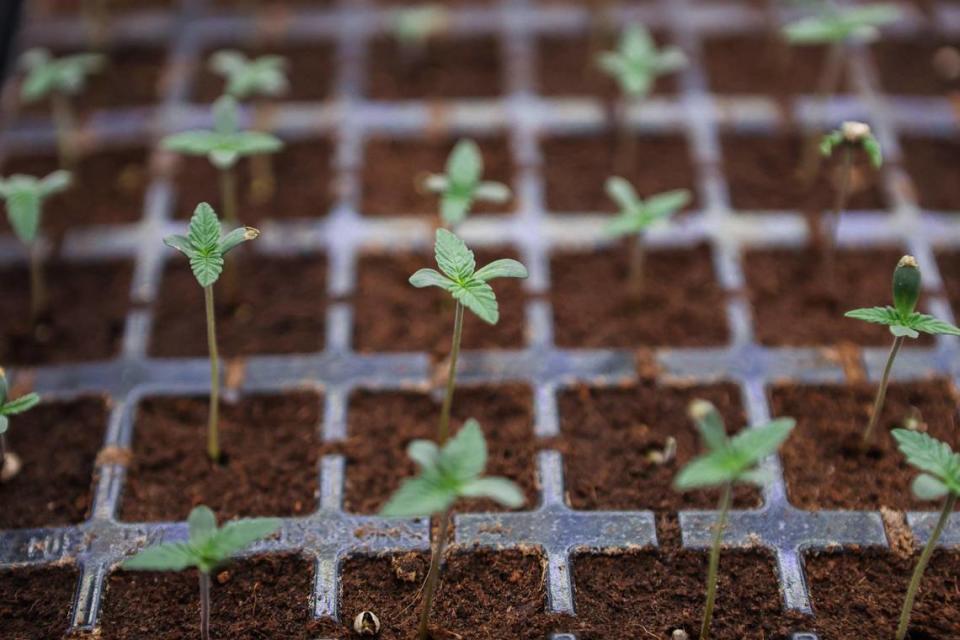
Skyrocketing sales — and competition?
Qualla Enterprises added a team of experts coast to coast with years in the business.
Qualla managers also consult, for instance, with Phylos Bioscience Inc., the cannabis genetics company based in Portland, Oregon, said James Bradley, an EBCI member and the Qualla Enterprises operations manager.
“They have a whole team of geneticists and growers that we can call and troubleshoot,” he said.
EBCI relies on outside experts “not just to understand our practices and our grow, but to also understand our climate and where we are as well,” said Kara Howard, Qualla Enterprises executive assistant. “And what they have to offer and how that would benefit us.”
The plan is ambitious — and might produce more supply than demand, at least initially, according to one industry expert.
Overproduction and underproduction can sink a cannabis operation, said Michael Mayes, CEO of Quantum 9, a Chicago-based cannabis consultant that’s helped clients start marijuana ventures in 27 states and six countries since 2012. The Observer contacted Mayes for his thoughts about the EBCI enterprise. He’s not working with the tribe.
Producing the planned 1,200 pounds a week could leave the EBCI with an enormous amount of unsold product, he said.
If all 9,600 people living on Qualla Boundary bought the maximum 6 ounces of product allowed by the Cannabis Control Board each month, that would amount to 345,600 ounces a year, Mayes said. And maybe half the population is too young to legally buy product, he said.
The tribe’s goal amounts to a whopping 998,400 ounces a year, he said.
Parker said that take wrongly assumes the EBCI’s market is only people living in the Qualla Boundary.
“Our actual market is the 10.4 million residents of North Carolina,” he said.
On April 6, the EBCI Tribal Council approved backing a loan of about $64 million to complete the medical marijuana project, lifting EBCI’s total investment to about $95 million. Non-gaming tribal revenues will fund the investment.
“We just want to get funded, because we’re under-capitalized,” Parker told the council before its 6-to-3 vote in favor of backing the loan.
In 2022, Parker said, North Carolina had the second highest illicit cannabis market in the United States at $3.2 billion, behind only Texas.
“It is past time that some portion of those folks, and many others, get the chance to buy medical cannabis that is tested, regulated and safe,” Parker said. “We are going to provide it for them, so overproduction is not a problem.”
Planet 13 Las Vegas is currently regarded by weed industry consultants interviewed by the Observer as the world’s largest cannabis superstore. Its 112,000-square-foot complex includes a 23,000-square-foot sales floor.
Parker said EBCI’s dispensary may not be the world’s largest in terms of building size, but the operation will top all others globally in the amount and quality of product offered.
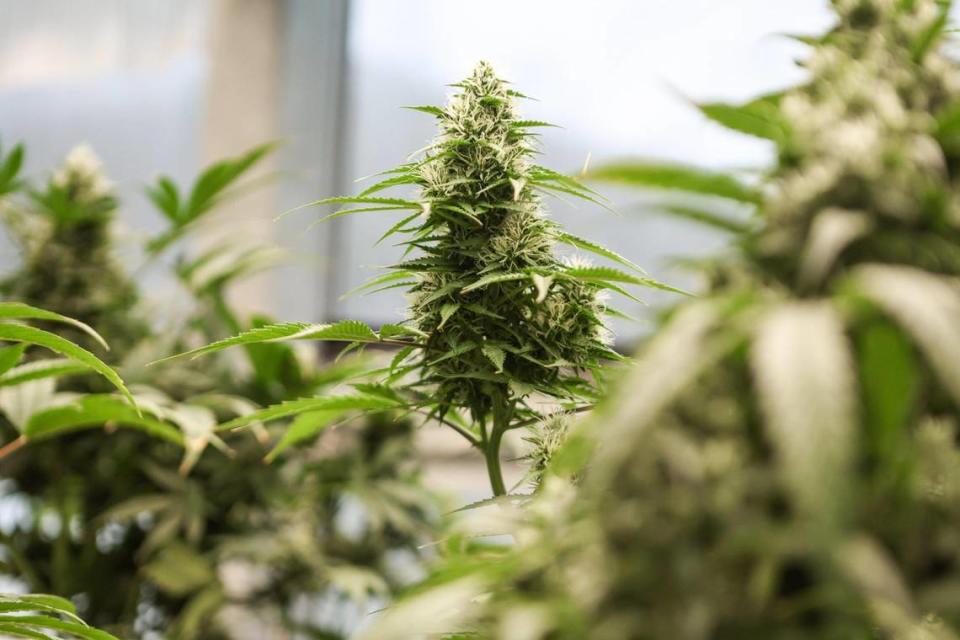
EBCI joins an industry that saw an estimated $30 billion in legal cannabis sales in the U.S. last year, according to leading cannabis market researcher New Frontier Data. Annual sales for both legalized medical and recreational cannabis are projected to surpass $35 billion in 2023, New Frontier Data reports.
If the pace of state-level legalization continues in the absence of federal policy reform, sales are expected to rise to an estimated $71 billion by 2030, according to New Frontier Data.
The Carolinas and nine other states have yet to legalize medical marijuana. North Carolina, for one, inches closer to approval.
North Carolina’s Compassionate Care Act, a bipartisan bill that sits in the state House, would allow those with “debilitating medical conditions,” such as cancer, epilepsy and Parkinson’s disease, to use medical marijuana. Patients under North Carolina’s legislation would need to provide written certifications from doctors stating they have a qualifying condition, and those under 18 would face specific restrictions on marijuana use.
State law currently lays out fines for misdemeanor possession of small amounts of marijuana and classifies any amount of 1.5 ounces or more as a felony. Outside the Qualla Boundary, the only type of marijuana considered legal for medical use is hemp extract — products that have a THC concentration of less than 0.9% and a CBD concentration of at least 5%.
Parker said the EBCI cannabis operation will be fine if the state legalizes medical cannabis, as expected.
He cited the Cherokees’ 10-month head start and its hiring of seasoned marijuana production experts to yield what he said is the best cannabis in the Southeast.
“There’s no doubt that there will be people that shop at a dispensary in Asheville or Charlotte that would have came to Cherokee otherwise,” Parker said.
“As much as you could look at numbers and say, yeah, that’s a little competitive, we also understand that cannabis is here,” he said. “It’s soon to be rescheduled federally. The entire nation is changing in cannabis. So it would be a little short-minded to sit here and focus only on competition theory between the state.”
Through on-site genetics research, Qualla Enterprises has developed two unique cannabis strains and expects to unveil many more, Parker said.
Where’s your R&D center, we asked.
“The. whole. place. is a damn research center,” Parker said with a smile, prompting chuckles from his management team.
“The room you just walked into has changed purposes three times since we built the building,” he said. “That’s how fast the R&D is happening. R&D determines next steps, and to be able to do that without costing yourself a ton of money is hard, but critical.
“Learning, growing in these hoop houses, that’s R&D in and of itself,” Bradley said. “Temperature, humidity, especially here in this climate, it’s all R&D for now.”
‘Grow their medicine’
Howard took us to the spot where Bradley planted the first seed, on June 9, 2022.
Bradley explained in intricate detail throughout a day-long tour how the plants grew, their various types and strains, the bar codes that track their lives from birth to sale.
“Hopefully down the road, at least my hope would be, that we do have our own breeding program, and we can make stuff that’s specific to our climate, to our environment,” Bradley said.
“That we can make strains that are mold-resistant, pest-resistant, things like that,” he said. “We can work closely with our genetics companies, and they can help us achieve that goal, so we grow something specific for our area and the conditions we have to deal with.”
Bradley lives in the Wolftown community on Qualla Boundary.
“It’s the love of the plant, really,” he said about his knowledge of the operation. “I love what I do, so I want to learn everything I can about it,” he said.
He wants to help EBCI members who obtain cannabis cards learn to grow the weed at their homes.
Qualla Enterprises may hold classes on growing techniques to get people started, Howard said.
“And that’s my personal goal,” Bradley said. “I’m all about the patient, so helping them to learn to grow their own. I’m trying to be what’s called a designated primary care giver. I could grow their medicine for them, and I could then find something that tailors specifically to their symptoms or whatever medical condition. I could grow that strain for them.”
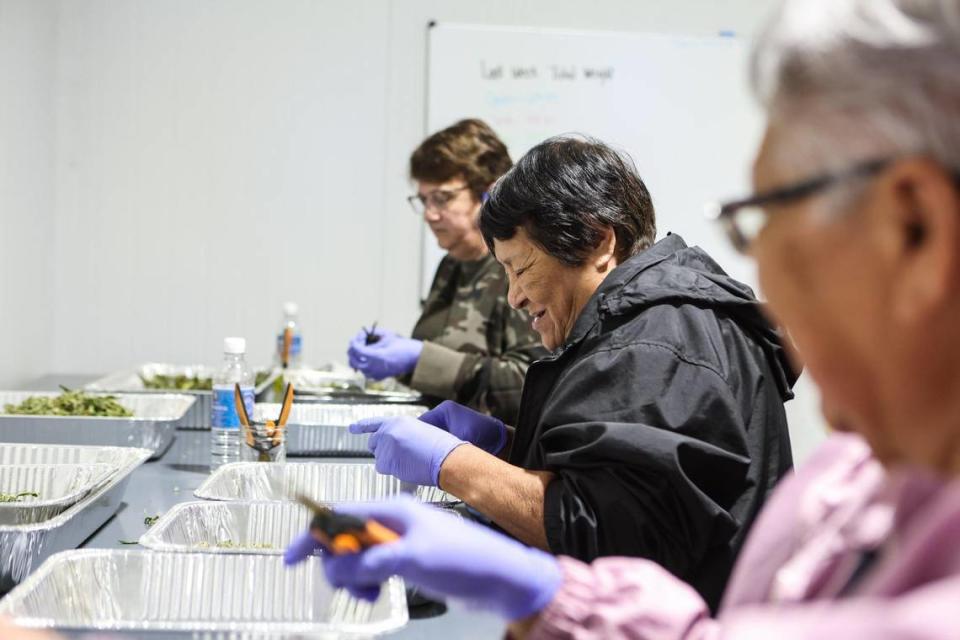
In another room, four tribal members ages 35 to 71 trimmed buds as peppy ‘80s dance hits blared from a radio.
“This is where you could really make or break your quality,” Parker said. “You need folks who are really detail-oriented, and these lovely ladies are doing a fantastic job. They’re doing a better job than anyone we could hire.
“It doesn’t matter if you’re 70 or 27,” Parker said. “We’ve got people from all walks of life, all demographics within our community that want to be a part of this.”
Casper Wolfe was the, err, greenest member of the trimming team.
“I may be the newbie” in the room, the 35-year-old EBCI member said. “But this has been a part of my heritage my whole life. It’s heritage. It’s not about the high or the money. It’s what we’ve always done as a people. It’s our medicine.”
‘A life-changing’ — and sovereign opportunity
At the old bingo hall that afternoon, 48-year-old EBCI member Stephen Watty said the tribal cannabis business changed his life.
“I do a little bit of everything,” the production technician said. “I work on the farm, help out growing, transplanting, harvesting. Here, I work with maintenance stuff, whatever needs to be done.”
He’s grateful to Qualla Enterprises for hiring him after he served 14 years for second-degree murder, he said.
“I’ve had a long journey,” Watty said. “I worked every day, just got caught up in the wrong place, the wrong time.”
“When I came home, I had to start over,” he said. “This company went all in for me, and it’s really changed my life, because this is a life-changing opportunity.”
Parker said he’s proud of the EBCI for entering the cannabis world and providing for a better future.
“I’m very proud of us utilizing our sovereignty to do things such as this,” he said, “that provide opportunity, medicine, economic diversity to our people in a rural community that much, much needs it.”

